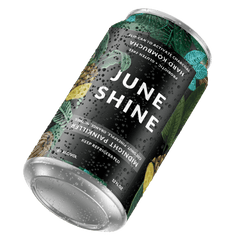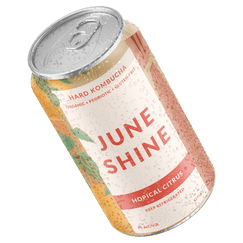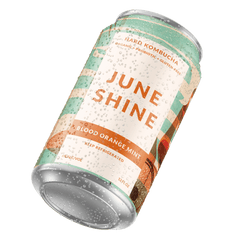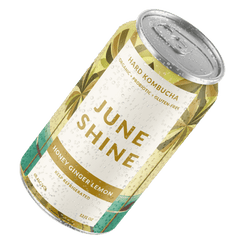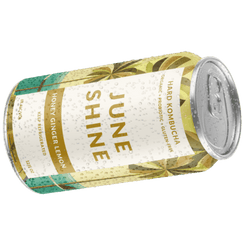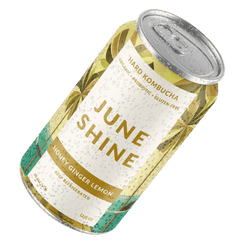How Much Caffeine Does Kombucha Have?

Well, Does Kombucha Have Caffeine? If So, How Much?
In the past few years, kombucha has found its way into the fridges of fitness and health enthusiasts worldwide. This beverage was first made in China nearly 2,000 years ago, and today you can grab a bottle at your local gas station.
Kombucha is a sparkling, fermented drink made from tea leaves that contains a host of probiotics. It’s known for its abundance of health benefits, as well as its distinct, tart taste (with a whole lot of smoothness, if you’re drinking JuneShine ;).
As most people know, traditional booch contains small amounts of alcohol, which is produced naturally during fermentation. During the process, as the yeast eats up and ferments the sugar, ethanol is created. As a result, trace amounts (less than .05%) of alcohol is left in the final product. Again, that’s with traditional kombucha, but if you’re drinking a hard kombucha, like JuneShine,, it went through a whole, secondary fermentation process, which gives it a little more punch.
Whether you’re drinking standard kombucha or the hard stuff, there’s one question on the line: does kombucha have caffeine?
Does Kombucha Contain Caffeine?
But does kombucha contain caffeine? People are sipping it in the mornings as a pick-me-up, so it would seem that it might.
Because kombucha is made from tea leaves, it’s always going to be caffeinated, at least slightly. Whether your kombucha is made from green, black, white, or oolong tea, there’s always at least a touch of caffeine.
But… kombucha has considerably less caffeine than other caffeinated drinks. Your average serving of kombucha will only contain around 15 mg of caffeine. For those who have a coffee bucket instead of a coffee mug, that’s barely enough to feel anything.
Ultimately, the specific amount of caffeine in your kombucha depends on the brand. Some companies add caffeine to their products, while others leave their drinks at the natural level. If you’ve hopped on the booch bandwagon and want to know more about how caffeine affects your fave drink, let’s go.
Is Drinking Kombucha Safe?
Caffeine is a central nervous system stimulant naturally found in tea, coffee, and cacao plants. It has been used for centuries to combat fatigue and raise alertness.
In North America, 80% of adults consume some type of caffeine every single day. Though regular caffeine consumption is considered safe, there are still some minor risks associated with it.
For one, drinking caffeine consistently can lead to dependence. If you can’t get up without a morning cup (or two or three) and you get headaches in the mid-afternoon when you need a pick-me-up, you know exactly what we’re talking about. Obviously, this isn’t the end of the world, and casual caffeine sippers will be totally fine, but it is something to consider.
So how safe is it to drink kombucha every day? As mentioned previously, the average kombucha contains about 15 mg of caffeine per serving. Some a bit less, some a bit more—for example, JuneShine contains 20 mg of caffeine per 12oz serving.
To put this into perspective, let’s compare the 15 mg of caffeine in kombucha to other caffeinated drinks—yep, it’s numbers time. A cup of brewed coffee contains almost 100 mg of caffeine, a typical can of soda contains nearly 50 mg of caffeine, and a normal can of an energy drink contains about 30 mg of caffeine.
The bottom line is that, yes, kombucha is safe to drink. You’re all good—go grab your booch.
Tea Steeping Times and Caffeine
If you’ve made it this far, you’ve gotta be a kombucha fiend—we applaud you. So, what are the factors that affect the amount of caffeine in your beloved booch? Kombucha is made from any type of sugar tea (a blend of tea leaves, sugar, and water), usually black or green tea.
The caffeine content is affected by how long the tea that becomes kombucha at the end of its lifecycle is steeped. The longer the tea is kept in hot liquid, the more caffeine will be released into the mixture.
The amount of caffeine in your kombucha can also be influenced by how hot the water is when steeping the tea. Higher temperatures cause the caffeine from the steeped tea to seep in faster. But all that jazz doesn’t really matter when you’re letting someone do the brewing for you. Someone fizzy; someone delicious, someone like… JuneShine.
The Longer It Ferments, The Less Caffeine Present
Much like the steeping process, the amount of caffeine in your kombucha is affected by how long it's fermented. While being fermented, the caffeine content of the blend is slowly being reduced. Therefore, longer fermentation times result in less caffeine.
The Right Caffeine Content for You
We just threw a whole lot of science about kombucha at you, but what does it actually mean for you? That it all just comes down to paying attention to the products you’re choosing and knowing how much caffeine you like to consume. Much like your address when you’re heading out on a Tinder date, it’s personal.
Ultimately, if drinking kombucha is giving you unpleasant effects, reduce your serving size. Listen to your body and pay attention to its cues. Enjoy only as much as you feel comfortable with, and it’s as simple as that.
Kombucha: A Light Caffeine Queen
The world of kombucha has exploded in the best possible way, and this delicious, health-forward drink is the go-to drink of people all over the globe. It is the perfect drink to wake up to, to sip throughout the day, or to enjoy at a cookout when your uncles can’t stop arguing over who should get to do the grilling. With just a dash of caffeine, this drink will keep you focused and energized all day, so that you can chill out to your heart’s content.
Looking for the smoothest, most innovative booch out there? We’ve got you, with flavors like Acai Berry, Blood Orange Mint, Chili Mango, and so much more. Is your mouth watering yet?
Sources:
fermentation | Definition, Process, & Facts | Britannica
8 Evidence-Based Health Benefits of Kombucha Tea | Healthline
